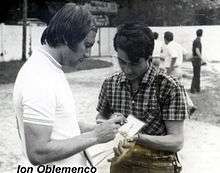Ion Oblemenco
 | |||
| Personal information | |||
|---|---|---|---|
| Full name | Ion Oblemenco | ||
| Date of birth | 13 May 1945 | ||
| Place of birth | Corabia, Romania | ||
| Date of death | 1 September 1996 (aged 51) | ||
| Place of death | Agadir, Morocco | ||
| Height | 1.82 m (6 ft 0 in) | ||
| Playing position | Striker | ||
| Youth career | |||
| 1958-1960 | Progresul Corabia | ||
| 1960-1962 | Electroputere Craiova | ||
| 1962-1964 | Universitatea Craiova | ||
| Senior career* | |||
| Years | Team | Apps | (Gls) |
| 1964-1966 | Rapid Bucureşti | 8 | (3) |
| 1966-1977 | Universitatea Craiova | 264 | (167) |
| 1962-1964 | FCM Galaţi | 10 | (15) |
| Total | 272 | (170) | |
| National team | |||
| 1967-1970 | Romania Olympic U-23 | 12 | (5) |
| Teams managed | |||
| 1979-1980 | Universitatea Craiova (assistant) | ||
| 1980-1982 | Universitatea Craiova | ||
| 1982-1985 | Chimia Râmnicu Vâlcea | ||
| 1985 | Olt Scorniceşti | ||
| 1992-1993 | Universitatea Craiova | ||
| 1996 | Hassania Agadir | ||
|
* Senior club appearances and goals counted for the domestic league only. | |||
Ion Oblemenco (13 May 1945 – 1 September 1996) was a Romanian football striker who spent the majority of his career playing for Universitatea Craiova. He is the club's all-time top goalscorer with a total of 167 goals, and the club's stadium is named in his honour.[1]
Early years
Oblemenco was born in Corabia, Olt County. He began his youth career in 1958 at the age of 13 at Progresul Corabia, where he played till 1960, and then moved to Electroputere Craiova for two years.
Club career
Rapid Bucharest
Oblemenco aged 19, was bought from CS Universitatea Craiova by Valentin Stănescu to Rapid Bucharest. He made his senior debut on 5 July 1964 and scored in a 3–1 defeat against his former club Universitatea Craiova. Oblemenco's first team opportunities were limited as he was kept out of the side by forwards Emil Dumitriu II and Ion Ionescu. He left Rapid in the Summer of 1966, and returned to Universitatea Craiova.
Universitatea Craiova
Oblemenco quickly became a leader and team captain for the Blue Lions. He debuted in a match against Dinamo Bucharest on 21 August 1966. In the following game he scored twice in a 3–2 win over Jiul Petroşani. In his first 1966–67 season Oblemenco was the top scorer in Divizia A with 17 goals in 23 appearances, and repeats the same performance three times in (1969-1970 - 19 goals), (1971-1972 - 19 goals) and (1972-1973 - 21 goals) being, along with Ştefan Dobay and Dudu Georgescu, the only players who obtained this achievement in Divizia A.
He rapidly became an adored star among the club's fans, and in his time there he elevated the team to the most successful era in its history. Oblemenco helped his side win its first championship title in 1973–74, over clubs like Steaua and Dinamo. He was nicknamed "The Gunner" because of his prolific and explosive goalscoring. His former teammate, Petre Deselnicu said: "I've kissed Oblemenco more than my wife, because he scored so many goals for our team". Oblemenco's final club was FCM Galaţi, where he retired in 1978. One of his biggest regrets was not playing for the national team.
Coaching career
After retiring as a player, he worked as assistant coach for Universitatea Craiova under Valentin Stănescu, together they managed to win the league title in the 1979–80 season, this was their second title in the history of the club. Oblemenco was then appointed as head coach. Nonetheless, he continued to enjoy success, winning the Romanian Cup and the championship in 1980–81 and also reaching the quarter-finals of the European Cup in 1982.
He also managed Chimia Râmnicu Vâlcea, Olt Scorniceşti and Hassania Agadir in Morocco.
Life and death
On October 28, 1972, during the 1972–73 season, Oblemenco was diagnosed with peptic ulcer.[2] He was successfully operated twice in October 1972.[2] He returned to the pitch in March 1973, in a match between Rapid Bucharest and Universitatea Craiova, in which he scored three goals.
Oblemenco died of heart attack[2] in a friendly match between the team he was managing, Hassania Agadir, and Union Sidi Kacem on 1 September 1996, aged 51.
Records
- Total matches played in Romanian First League: 272 matches - 170 goals
- Topscorer of Romanian First League: 1967, 1970, 1972, 1973
- European Cups: 9 matches - 4 goals
- U-23 national team: 12 matches - 5 goals
- He has scored 170 goals in Liga I, being ranked 5th in the all time scoring table, but he has never been capped for Romania.
- He played for Romania's U-23 side touring Uruguay, Brazil and Africa.
Bibliography
- Marius Popescu, Ion Oblemenco și campioana unei mari iubiri, Scrisul Românesc, 1975
References
- ↑ Jianu, Ion (2010-05-13). "Oblemenco, nemuritorul" (in Romanian). Gazeta de Sud.
- 1 2 3 "Tunarul din Bănie" (in Romanian). Adevărul. Retrieved 11 March 2011.